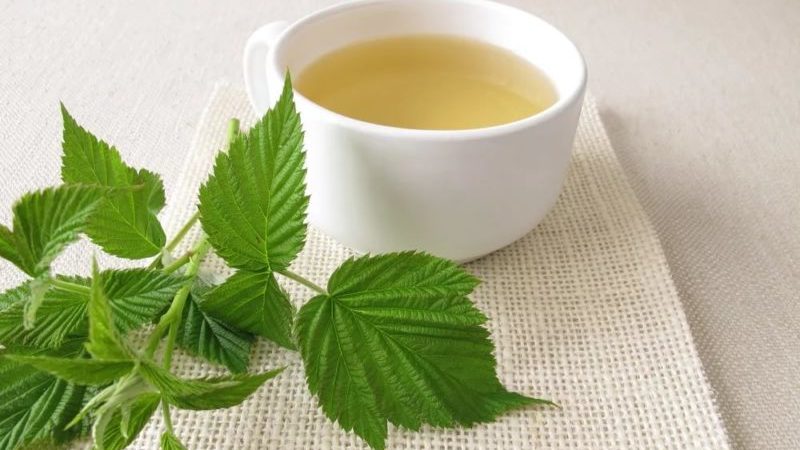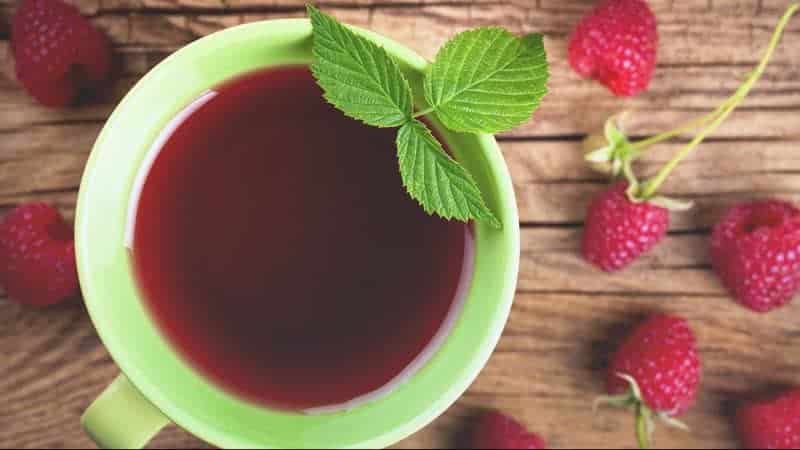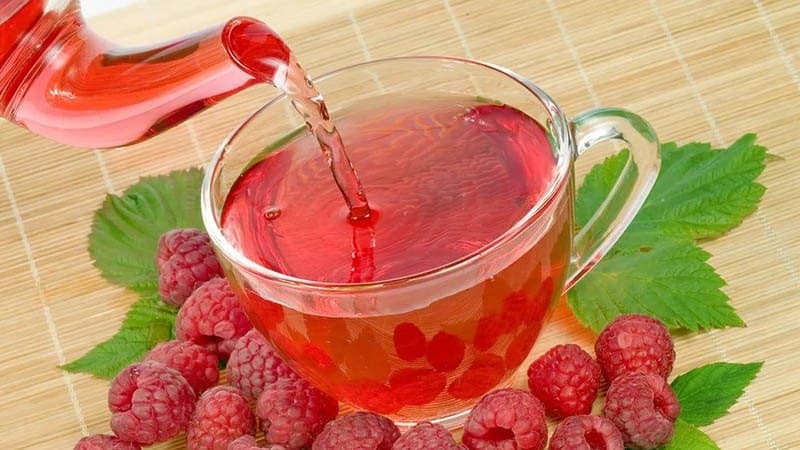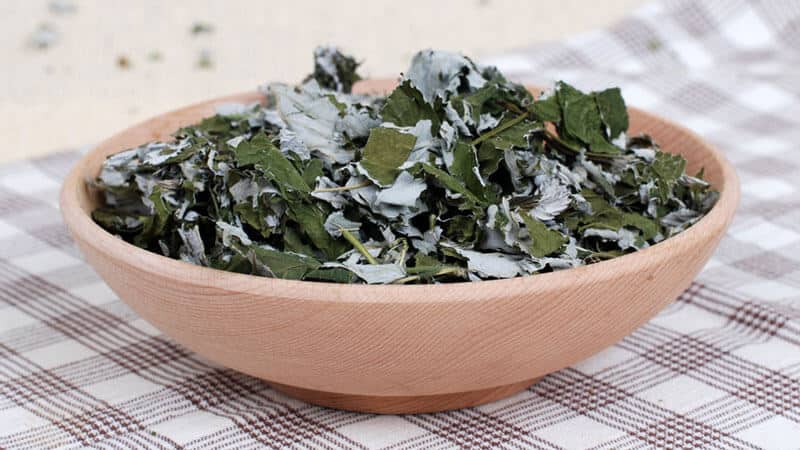A decoction of raspberry leaves is a healthy tea.
In ancient times, raspberries were considered a symbol of kindness. According to legend, tea made from its leaves helped during childbirth. A branch located at the entrance of the house warded off evil spirits, and a reed attached to the horse's neck calmed it.
Today, raspberries are a tasty and healthy product that helps replenish the body’s reserves of substances necessary for the body and fight various diseases, especially colds. Moreover, not only berries, but also leaves, branches and even roots are suitable for medicinal purposes. Let's look at what a decoction of raspberry leaves is, how it is useful and how to prepare it.
A little about the benefits of raspberry leaves
Raspberries are a healthy and tasty berry, appreciated by many generations. After all, the first remedy for a cold is tea with raspberry jam.
Reference. The leaves of the plant are also useful. They are less allergenic and contain 6 times more vitamin C than berries.
A drink made from leaves is a universal natural remedy that has a diverse positive effect on the body. It is used as part of the complex treatment of many diseases, and is used as a basis for various tinctures and decoctions.

Chemical composition
Raspberry leaves have a rich chemical composition. They contain a large number of different beneficial substances, including:
- Vitamins: A, B1, B2, B5, B6, B9, C, E, H (biotin), PP.
- Macroelements: calcium, phosphorus, magnesium, potassium, sodium, sulfur, chlorine.
- Microelements: iron, cobalt, manganese, copper, fluorine, molybdenum, zinc.
- Organic acids: salicylic, citric, ellagic, malic.
- Biologically active substances: phytoncides (natural antibiotics), essential oils, bioflavonoids, tannins, antioxidants, resins.
The composition contains natural pectins, fiber, sugars, saponins, and dietary fiber. The energy value is 46 kcal per 100 g of product.
What are the benefits of raspberry tea?
The product has a pronounced therapeutic effect, which is due to the high content of biologically active components. It is used not only in folk, but also in official medicine.
Reference. Pharmacies sell an assortment of preparations based on raspberry leaves: preparations, teas, extracts, dietary supplements, etc.
Tea made from raspberry leaves is definitely beneficial for human health, as it promotes:
- decrease in body temperature during colds;
- strengthening the immune system;
- elimination of inflammatory processes;
- accelerating and facilitating the discharge of sputum when coughing;
- normalization of metabolic processes;
- eliminating swelling;
- accelerating wound healing;
- cleansing the body of toxins;
- improving the condition of the skin;
- normalization of the cardiovascular and digestive systems;
- alleviating the symptoms of menopause.
The decoction helps cope with the effects of stress, eliminates nervousness and insomnia, and improves mental and physical activity.
Is it possible for pregnant women?

The drink is not recommended for consumption during the first and second trimesters of pregnancy, as it can harm the fetus, increase the tone of the uterus and cause miscarriage.
In the third trimester of pregnancy, starting from the 32nd week, it is permissible to take in limited quantities, but after consulting with your doctor.Tea is believed to improve well-being women, reduces the need to stimulate labor.
Nursing
During breastfeeding, the drink is introduced into the diet only six months after birth. This can be explained by the fact that tea can cause allergic reactions in a child, skin rashes, and redness. It is recommended to include it in the diet in small portions, carefully observing the child’s reaction.
For children
Raspberry tea is allowed to be given to children from 8 months as a homemade antipyretic, anti-inflammatory and mild pain reliever.
Reference. Up to 8 months, the leaves are used to prepare decoctions for bathing. Baths have soothing properties and help eliminate prickly heat.
It is better to start taking it with 2 tsp, and wait a day after the first use. If no undesirable reactions are detected, the child can be given the drink, gradually increasing the portion.
Possible harm and contraindications
Along with its high effectiveness and benefits, raspberry leaf tea can be harmful. This is observed in case of non-compliance with the measure. In case of overdose, the salicylic acid contained in the plant causes side effects:
- nausea, stomach pain;
- congestion in the ears;
- dizziness and confusion;
- weakness.
If undesirable reactions occur, you should stop drinking tea, take any sorbent (activated carbon, Filtrum), and consult a doctor.
Raspberry leaf decoction is contraindicated in the following cases:
- Individual intolerance.
- Diseases of the digestive system: gastritis, gastric ulcer. Increases the acidity of gastric juice, which aggravates the course of the disease.
- Bronchial asthma.Causes asthma attacks due to the content of essential oils.
- Gout. It affects metabolic processes, which can aggravate the condition.
- Children's age up to 8 months.
- Early pregnancy.
Use with caution for urolithiasis. The drink has a strong diuretic property, which can cause the movement of stones, colic, and attacks of severe pain.
How to make the best raspberry tea

An important condition for creating tasty and healthy tea from raspberry leaves is the correct preparation of raw materials, which includes:
- choosing quality leaves from a seller or collecting them yourself;
- drying the product;
- correct storage.
There are a large number of cooking methods, so you just have to choose according to your taste.
Choosing leaves when purchasing
An assortment of raw materials is presented in pharmacies in cardboard or film packaging, tea bags for easy brewing, in the form of an extract, capsules with crushed leaves, etc. But in this case, it is difficult to assess the quality. If it is not possible to prepare a product, but you want to be sure of its quality, you should contact people who are engaged in such preparations.
It is better to purchase fresh leaves and process them yourself. When purchasing, you need to pay attention to the characteristics:
- no damage or stains;
- rich aroma with a slight raspberry tint;
- dense structure, reminiscent of a sheet of paper;
- after slight compression it regains its shape and does not tear.
This indicates that the foliage was recently picked from the bush, did not have time to lie still and is suitable for further processing.
How to collect it yourself and how to dry the leaves
Raspberries grow everywhere in gardens and in nature, so making preparations for the winter is not difficult. When collecting raw materials, some conditions should be taken into account:
- Time of year - from May to July during the flowering of the bush.
- The weather should be dry and sunny.
- Collection places - garden plot, forest, forest belts, remote from roads and industrial facilities. The leaves of wild shrubs are considered more beneficial.
- Select whole, juicy leaves without damage.
- The berries are picked or cut off with scissors, and the stalk is removed.
The drying process of raw materials is as follows:
- Spread in a thin layer on cotton cloth or paper.
- Place in a dark room with good ventilation.
- Turn over occasionally to ensure even drying.
- Readiness to check by the fragility of the sheet. When pressed it should crunch and crumble.
Store raw materials for up to 2 years in paper or linen bags at room temperature in a dark place.
How to cook
There are many recipes for making the drink. Let's look at the most popular ones.
| Recipe | Components | Method of preparation and use |
| Classical | 4 tbsp. l. raw materials
1 liter of boiling water |
Pour the raw materials into the teapot and pour boiling water over it. Cover with a towel and leave to steep for 30 minutes. Strain.
Drink warm, 1 tbsp. twice a day. |
| Tonic | 3 tsp. leaves,
0.5 l hot water |
Combine the ingredients and leave to infuse for 20 minutes.
Take 2 times a day, 1 tbsp. |
| For a cold | 2 tbsp. l. product,
200 ml hot water |
Combine the ingredients, leave for 50 minutes, strain.
Drink instead of tea. Suitable for gargling and mouthwash. |
What does raspberry tea go with?
The product combines well with various products and herbal raw materials. To increase the medicinal properties and positive effects on the body, the leaves of the following plants are additionally used:
- Cherry. The collection increases the body's protective functions, strengthens blood vessels, improves heart function, and stops bleeding. To prepare, mix 1 tsp. raw materials, pour 1 tbsp. boiling water and leave for 15 minutes.
- Currant. The combination enhances the anti-inflammatory and diuretic properties of the decoction. Take 1 tbsp. l. raw materials, pour 1 tbsp. hot water, leave in a thermos for 15 minutes.
- Oregano and coltsfoot. Helps well with coughs and bronchitis. Measure out 1 tbsp. l. each type of raw material and mix thoroughly. 1 tbsp. l. the resulting mixture is steamed with 1 tbsp. boiling water and leave for half an hour.
To improve the taste and aroma and add variety, the drink is infused with mint, rose petals, and citrus zest. And add 1 tsp to the already brewed and strained broth. honey and a small cinnamon stick. It turns out to be a tonic that is best drunk in the first half of the day.
Is there any benefit from fermented food?

Fermentation is the process of processing leaves to obtain a product with certain taste and aromatic properties.. It is carried out in several stages: withering, twisting, fermentation and drying.
An important point: drying of raw materials is carried out at high temperatures - from +60 to 90°C. However, with this method of harvesting, some beneficial substances are destroyed or lose their medicinal properties.
By usefulness With inferior to raw materials harvested and dried independently in a natural way.
Conclusion
Tea made from raspberry leaves is in no way inferior in benefits to a drink made from the berry. It also contains large amounts of vitamins and minerals, but is less likely to cause allergic reactions. The product has a positive effect on the body and is effective against colds.Goes well with various herbs and products: honey, oregano, currants.